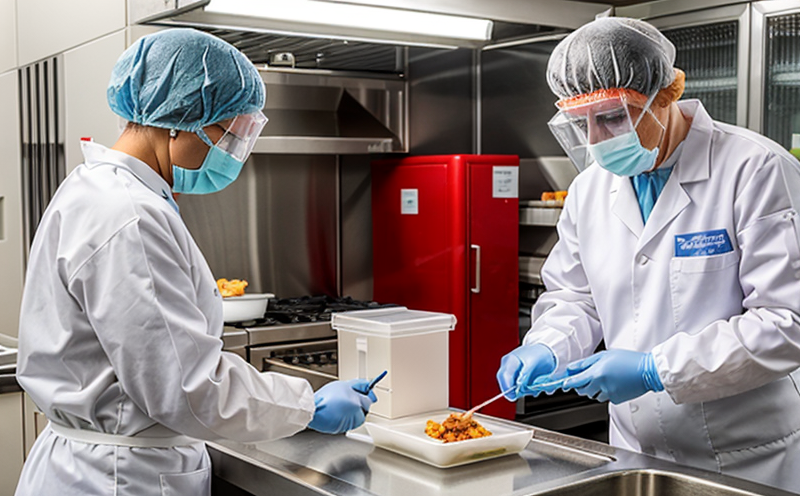EFSA Methodological Framework for Foodborne Virus Testing in Laboratories
The European Food Safety Authority (EFSA) has established a comprehensive methodological framework to ensure accurate and reliable detection of foodborne viruses. This framework is crucial for maintaining public health and ensuring the safety of the food supply chain. The EFSA guidelines provide laboratories with detailed instructions on specimen preparation, sample handling, and testing methodologies, including real-time reverse transcription polymerase chain reaction (rRT-PCR) and other advanced techniques.
The methodological framework is designed to standardize the approach across different laboratories, thereby reducing variability in results. It also emphasizes the importance of quality assurance and reliability in foodborne virus testing. The guidelines cover a range of topics including specimen collection, transport media, sample preparation, extraction methods, and detection limits. Compliance with these standards ensures that laboratory results are accurate, reproducible, and comparable across different jurisdictions.
One key aspect of the EFSA framework is its emphasis on the use of validated reagents and kits for testing foodborne viruses. The guidelines recommend the use of standardized reagents and kits to ensure consistent performance and accuracy in test results. Additionally, the framework encourages laboratories to participate in proficiency testing programs to validate their methods and ensure compliance with international standards.
Another important component of the EFSA methodological framework is the emphasis on proper sample handling and storage. The guidelines provide detailed instructions on how to collect, transport, and store samples to minimize contamination and degradation. Proper sample handling is crucial for ensuring accurate test results, as even minor deviations in specimen preparation can lead to misleading or inaccurate results.
The EFSA methodological framework also emphasizes the importance of proper instrumentation and calibration. Laboratories are encouraged to use calibrated instruments and ensure that they are maintained according to manufacturer specifications. Regular calibration of instruments ensures consistent and reliable testing results.
Compliance with the EFSA methodological framework is essential for maintaining public health and ensuring the safety of the food supply chain. Laboratories that adhere to these guidelines can be confident in their test results, which can help identify potential outbreaks early and take appropriate action to prevent further spread of contamination.
Eurolab Advantages
We at Eurolab offer unparalleled expertise in food safety testing, including the implementation of the EFSA methodological framework. Our team of experienced scientists and engineers is committed to providing high-quality services that meet or exceed international standards.
- Compliance with EFSA guidelines ensures accurate and reliable detection of foodborne viruses.
- We provide a wide range of testing options, including real-time reverse transcription polymerase chain reaction (rRT-PCR) and other advanced techniques.
- Our laboratories are equipped with the latest instrumentation and calibration tools to ensure consistent and reliable testing results.
- We encourage participation in proficiency testing programs to validate our methods and ensure compliance with international standards.
At Eurolab, we understand the importance of quality assurance and reliability in foodborne virus testing. Our services are designed to help laboratories maintain high-quality testing practices that contribute to public health and safety.
Quality and Reliability Assurance
- The use of validated reagents ensures consistent performance and accuracy in test results.
- Proper sample handling is crucial for ensuring accurate test results. Even minor deviations in specimen preparation can lead to misleading or inaccurate results.
- Instrumentation plays a critical role in ensuring consistent and reliable testing results. Laboratories are encouraged to use calibrated instruments and ensure that they are maintained according to manufacturer specifications.
| Sample Collection Methodologies | Transport Media | Storage Conditions |
|---|---|---|
| Swabbing of food surfaces or direct sampling from contaminated foods. | Amies Transport Swabs or similar media. | -20°C freezer or refrigerated transport for up to 48 hours. |
Use Cases and Application Examples
- The EFSA methodological framework is applicable in various scenarios, including outbreak investigations, routine food safety monitoring, and research studies.
- Foodborne virus testing can help identify potential outbreaks early and take appropriate action to prevent further spread of contamination.
| Use Cases | Application Examples |
|---|---|
| Epidemiological investigations | Detection of Norovirus in contaminated shellfish during an outbreak investigation. |
| Routine food safety monitoring | Testing for Hepatitis A virus in a batch of imported fruits. |
| Research studies | Investigating the prevalence of rotavirus in infant formula samples. |





